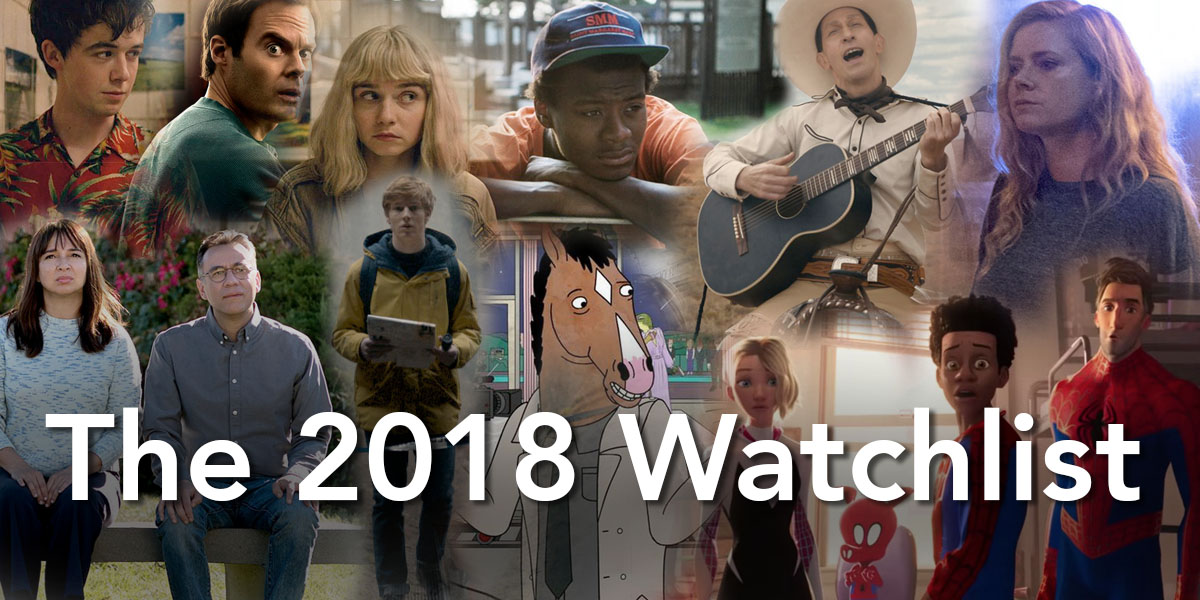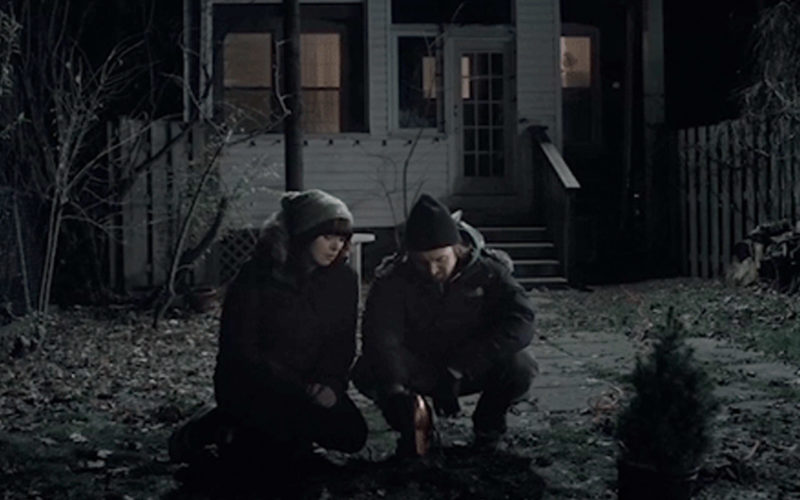2018 was the year that TV finally won.
This end of the year “best of” compendium used to be a strictly “movies only” list— a place meant to champion the thrill and power of the theatrical experience. But, then, kids happened…and TV got so good…and, well, you know, going to the theater got harder. Dammit! I sound so boring…
Suffice it to say: I watched way less movies in a theater this year than normal, and filled in the gaps with the all mighty projector screen that now resides in my basement. Instead of putting “unworthy” films on this list to scrape together a top 10, I decided to just list my favorite viewing experiences of the year no matter their release format.
As always, a disclaimer: my criteria for this list is highly unscientific and, while there are probably more “important” films and television shows that were released this year, these are the ones I just liked the best.
Enjoy!
Sharp Objects: Limited Series
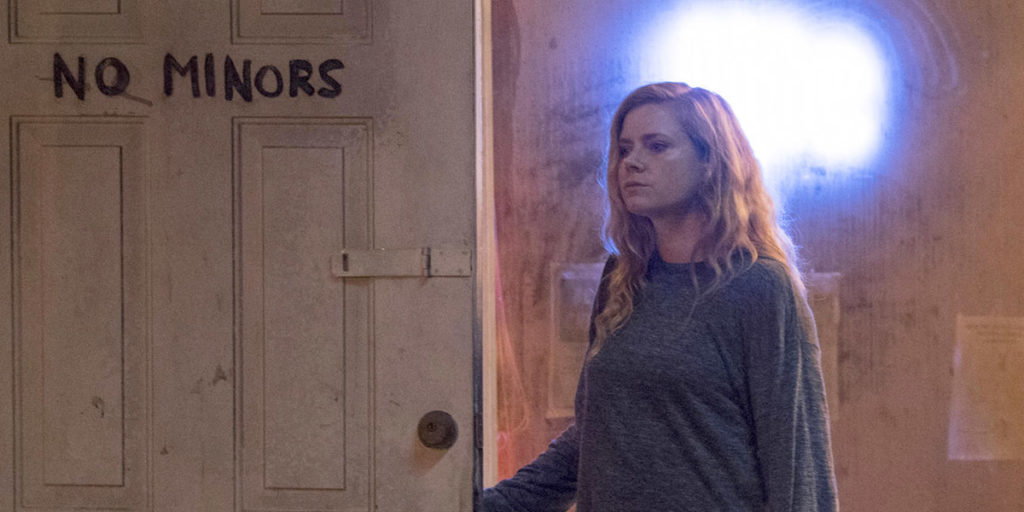
I almost gave up on Sharp Objects. It’s a Southern Gothic slow burn…and I do mean SLOOOOOW. But, then, a few episodes in, I settled into director Jean-Marc Vallée’s whiskey haze groove and started to vibe with the tone. Objects is a mystery thriller, but not in the Gone Girl sort of way (it’s based on Gillian Flynn’s debut novel). The two central murders happen early and the investigation that surrounds them isn’t particularly riveting. But, Amy Adams is doing great work as an alcoholic reporter dealing with a traumatic past, and her supporting cast is equally adept. The series is also a masterclass in tonal execution and atmosphere.You can really feel the town of Wind Gap, Missouri and, as such, you begin to invest in all the unsavory stuff hidden underneath its sheen of middle-American piety. After this and Big Little Lies, Vallée has proven himself to be the reigning king of match cuts and clever editing choices—a seamless blend of past, present, and hallucination. And, then, there’s the ending. Things may start slow, but the last two episodes ramp it up in riveting fashion, with a final reveal/twist that serves as one hell of a mic-drop. Don’t tell Mama…
Forever: Season 1
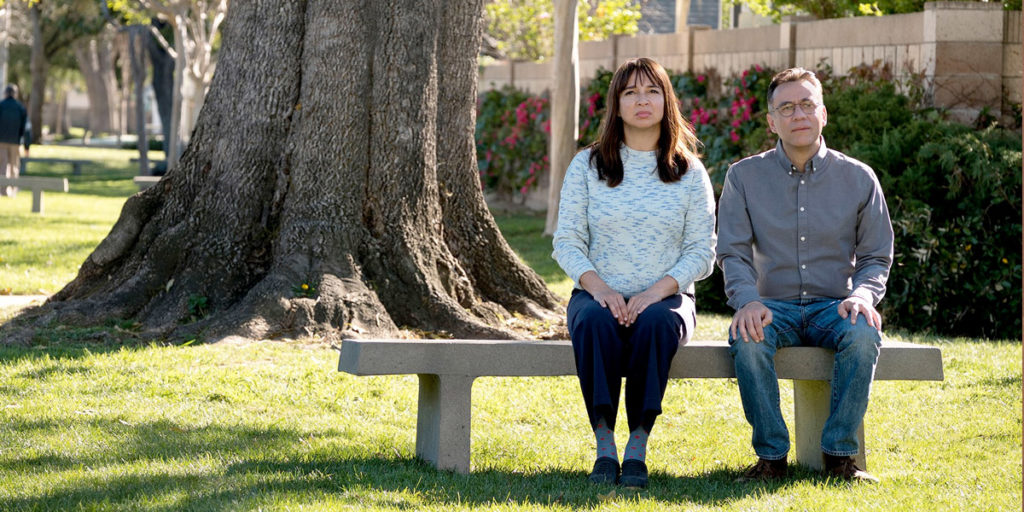
I’ve never seen a TV show that doesn’t actually reveal its premise until 3 episodes in, and even when that does happen, you still have no idea where things are going. But, Forever manages to do that. It’s the type of project that could only exist now on a streaming service, where a major network didn’t feel the need to “explain the show” in a pithy one-liner and poster.
Without spoiling things, Forever is about boring love. But, I promise, it’s not as dull as that sounds. Rather, creators Alan Yang and Matt Hubbard have found a very high concept way to look at the old trope of a marriage that is slowly falling into complacency. It feels real and honest. And, then, it gives everything a new spin by placing its characters in a very unique world that constantly keeps you guessing via it’s strangeness.
It’s also funny. Not, “HA HA” funny, but amusing and wry, with clever dialogue and moments that will make you smirk long after. While I do like Fred Armisen he feels a bit miscast here (it’s just hard to picture Armisen as an every-man and not the delightful weirdo he is). But, Maya Rudolph is fantastic—funny, but not broad, and dramatic and heartfelt when she needs to be. Watch this without reading anything about it. Let it surprise you.
Orange is the New Black: Season 6
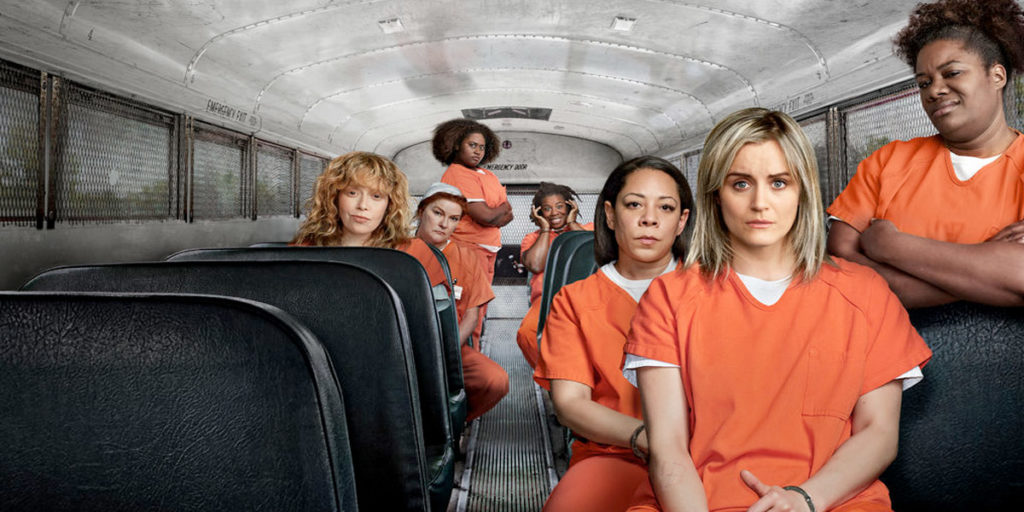
Season five of Netflix’s venerable Orange is the New Black was kind of bust. While I respect it for attempting to do something different (i.e. setting an entire season over the course of three days during a prison riot), it ended up being a mediocre and messy experience, resulting in a lot of filler episodes.
But, I’m glad it happened because it provided the set-up necessary for a really strong sixth season that has given the show some much needed momentum, relocating things to a new setting (maximum security prison) and providing new character goals and focus. Piper Chapman, the show’s “Trojan horse” protagonist, has always been Orange’s least interesting personality, and the writers wisely limit her role, using her more as a symbol for white privilege rather than making her the center of the action.
Granted, Orange is the New Black has always been more than just a white, affluent fish-out-of water story—since season one it has been committed to telling deep stories about diverse and layered women. But, season six pushes the show in a new direction, introducing fresh characters and touching upon relevant, socially conscious topics in a way that feels insightful. It’s a balancing act to be sure, but it’s a testament to strong writing that Orange has never felt like some sort of angry polemic about the prison industrial complex. Rather, it’s a show that uses people to convey larger points about injustice in this country. Not sure how many seasons Jenji Kohan has left in her, but based on this outing, there’s at least a few years left in Orange’s sentence.
The Ballad of Buster Scruggs
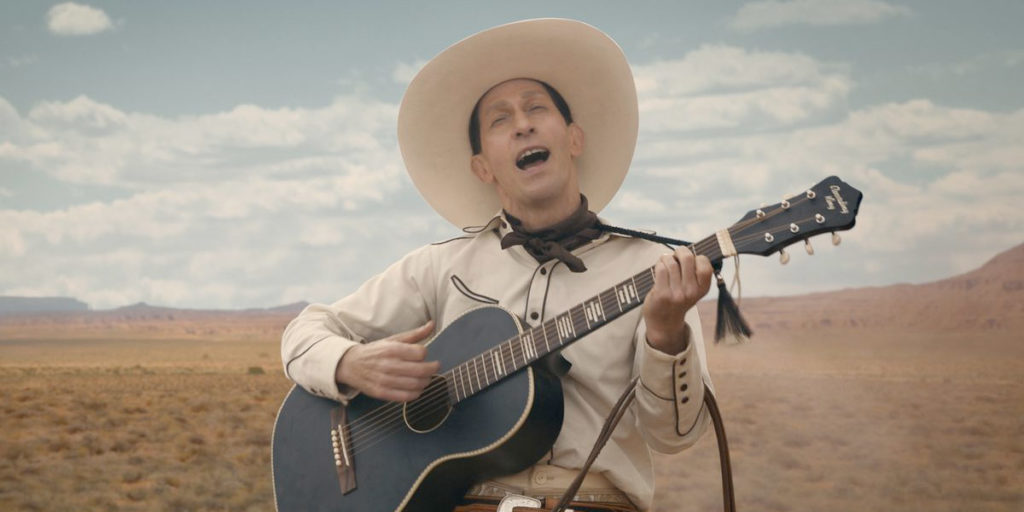
The newest Coen Brothers film isn’t this type of movie you recommend to people at a dinner party. It’s a dark, slow-moving, mostly plotless episodic foray into the old west. This isn’t a feel good picture. It’s not even overtly trying to be entertaining…I’ll admit, I got bored during portions of certain episodes.
But, it’s just so damn Coen. Honestly, I’m not sure if that’s actual praise, but if you subscribe to the auteur theory, this is just a perfect encapsulation of their “voice”: a highly literate and theatrical take on the indifferent, cosmic joke nature of the universe. It’s verbose and mean-spirited and beautifully shot. In a way, it’s a fitting encapsulation of the “frontier” as a concept—something that is defined by myth but is underscored by a much blander and harsher reality. After all, in truth, there were no heroic gunslingers but rather just people who slept in the dirt and smelled terrible.
Moments drag, yes, but certain images and sequences are stuck indelibly in my brain, from the slapstick and broad musical numbers (the Coens’ love for old Hollywood is on full display) to moments of grim and harsh reality. It’s a true Coen smorgasbord, random and over-stuffed, but distinctly of their style and flavor. I often rip on how much the movie industry has changed—the death of the cinematic experience in favor of instant watch-now gratification. But, Scruggs is actually a perfect fit for the Netflix model. All at once, it’s just too much Coen…too weird, too nihilistic. But, in separate portions, the sum of these parts ends up working to create a distinctive and bleakly-satisfying experience.
Dark: Season 1
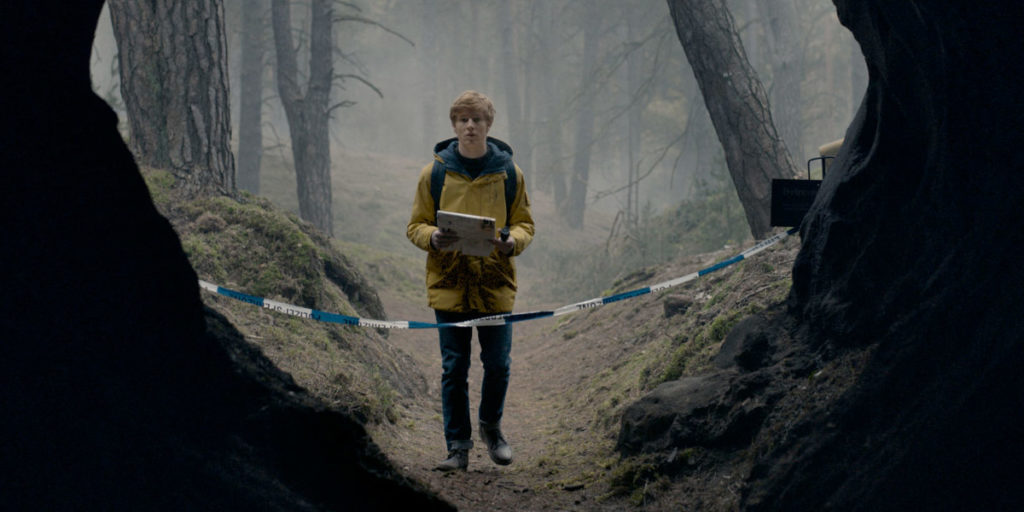
I’m a time travel junkie. So, despite its slow pacing and ponderous mood, Dark—Netflix’s first German language original series—had me hooked. On the surface there are parallels to Netflix’s mega-hit Stranger Things (small town, kids, the 1980s, a mysterious science facility buried in the woods), but when it comes to tone, they feel like they belong on separate planets. Whereas Stranger Things is trying to capture the heart and charm of 80s Amblin, Dark is considerably more…um…dark.
The series is essentially a referendum on time travel tropes, finding a way to take all the things you’ve come to expect in your time travel cinema and give them new (and really f-cked up) spins. The result is a multi-layered behemoth of a show that will tie your brain in figurative knots as you attempt to unravel all the various timelines and keep track of the huge cast of characters. But, it’s not obtuse either. It’s challenging, but never inaccessible, featuring some terrific editing tricks to keep the viewer aligned with its tangle of a plot. It also boasts one of the more inspired soundtracks in recent memory—every episode had me heading to Spotify as soon as the credits started to roll.
The End of the F**king World: Season 1
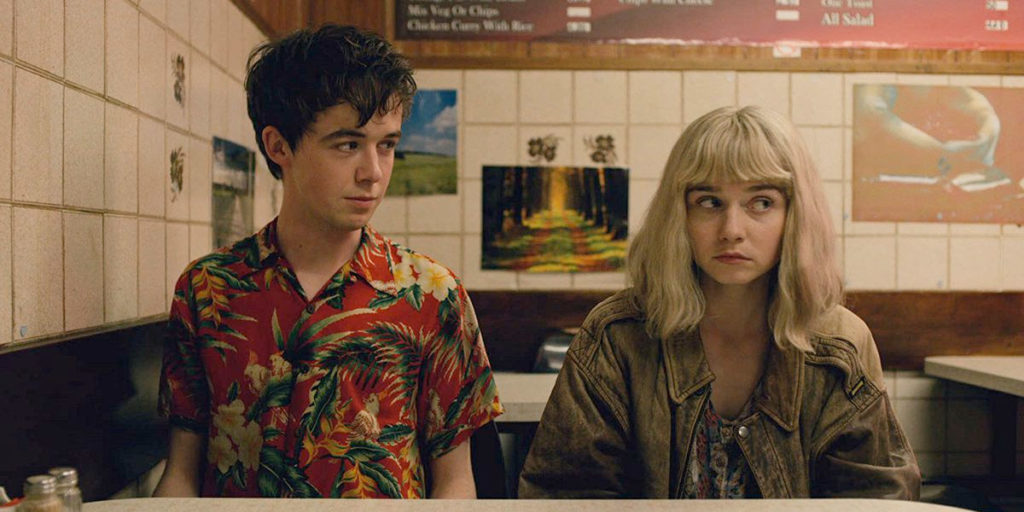
Angst ridden teen stories are ubiquitous, but somehow this Netflix gem managed to give things a new spin. Or, maybe new isn’t the right word. Rather, End comes off like some sort of love child between True Romance and Heathers (with Harold and Maude joining in for some sweet ménage à trois action). And, yeah, it somehow works. I’m going to talk a lot about “tone juggling” in this end-of-the-year list and this series is a perfect example of that concept. It’s funny when it needs to be, but also not scared of committing to darkness. The show also respects the humanity of its characters. That may sound odd because the male protagonist (James played by Alex Lawther) literally believes himself to be a psychopath, but this first season captures the alienation of being a teenager—awkward and weird— in a way that is quite effecting. End understands that being an outcast can be its own form of insanity. And, so, the emotional bond that develops between James and Ayssa (Jessica Barden with terrific comedic timing) along their crazy road-trip of mishaps resonates. After all, at the end of the world, don’t we just want to be with someone who understands us?
Minding the Gap
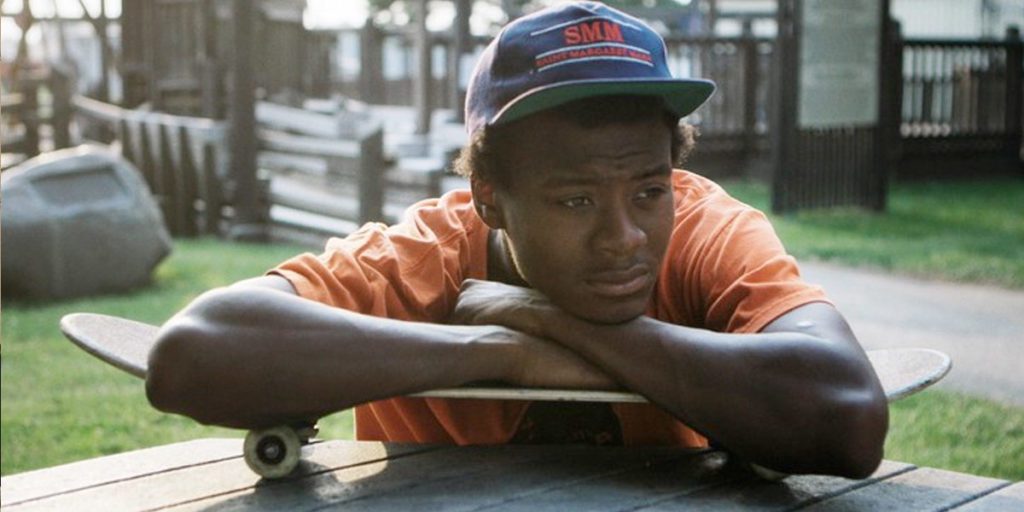
Because I screen so many for Short of the Week, a documentary needs to be truly excellent to impress me. Enter, from stage right, Minding the Gap from director Bing Liu…
Ever since the popularization of YouTube and online video, skate videos have been ubiquitous. But, Liu takes the basic framework—the sick ollies and tricks—and uses it as the foundation for a much deeper and introspective look into masculinity, domestic abuse, and the feeling of being trapped in a prison of middle-American banality.
It’s a movie that should feel cliché, as it’s covering some hackneyed tropes: hanging with your buds, “soul skating,” growing up in a nowhere town with nowhere to go. You know, broken homes and broken dreams stuff. But, in recounting the rust belt life of his friends and himself—from adolescence to adulthood—Liu creates a vivid portrait of abuse, hope, and failure. And, despite being about such innately emotional and heavy topics, amazingly, it’s not a bummer to watch. It’s sad and heartbreaking, at times, to be sure. But, Liu has such a subtle, deft touch as a documentarian, and since he’s been a part of this circle of friends since he was a kid, he makes sure the viewer never feels as if he/she is an outsider. Rather, we become a part of this inner sanctum of skate therapy. We float with his crew as they glide effortlessly from one paved street to another. It almost feels like you’re flying.
Black Panther
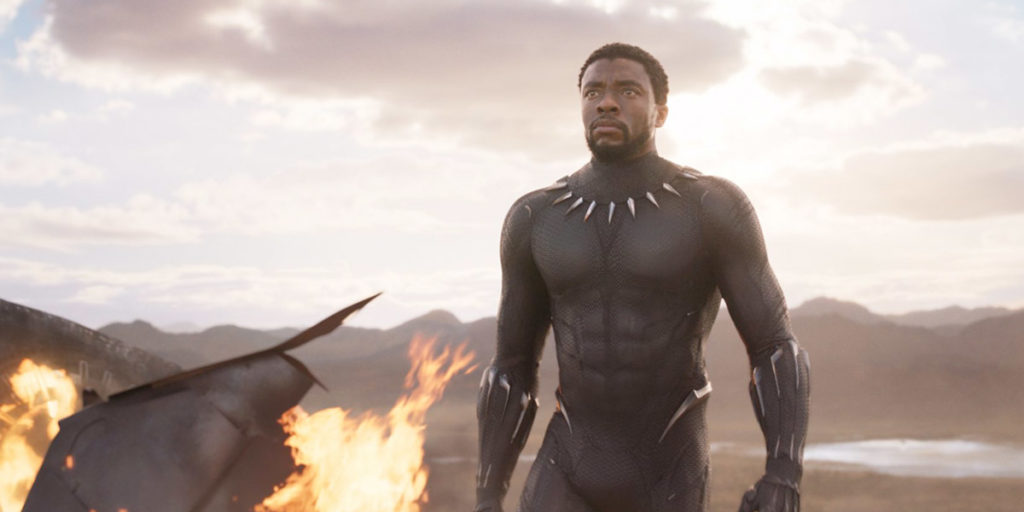
As much fun as I had with Infinity War (and believe me, I had a lot of fun), Black Panther feels more important. Yeah, I know you’ve read the think pieces—it’s important to have a diverse superhero film crafted by diverse filmmaking talent (After Creed, I’d follow Ryan Coogler anywhere). But, this is more than just a “Black” superhero movie. It’s a film that actually has something on its mind. Moreover, it presents a legitimately awesome villain (my man crush Michael B. Jordan) with a point of view that is thought-provoking and actually makes sense. The result is a Marvel movie that is more than just another entry in the biggest, most expensive Saturday morning cartoon ever made.
And, no, it’s not perfect…I have do have critiques. The movie takes too long to really get going (I wasn’t fully invested for the first 30 minutes or so) and the CGI, at times, is wonky. But, all that is forgiven when you get a line like the one delivered during Killmonger’s final scene: “Bury me in the ocean, with my ancestors that jumped from the ships, because they knew death was better than bondage.”
That’s poetry, folks. Wakanda forever!
Hereditary
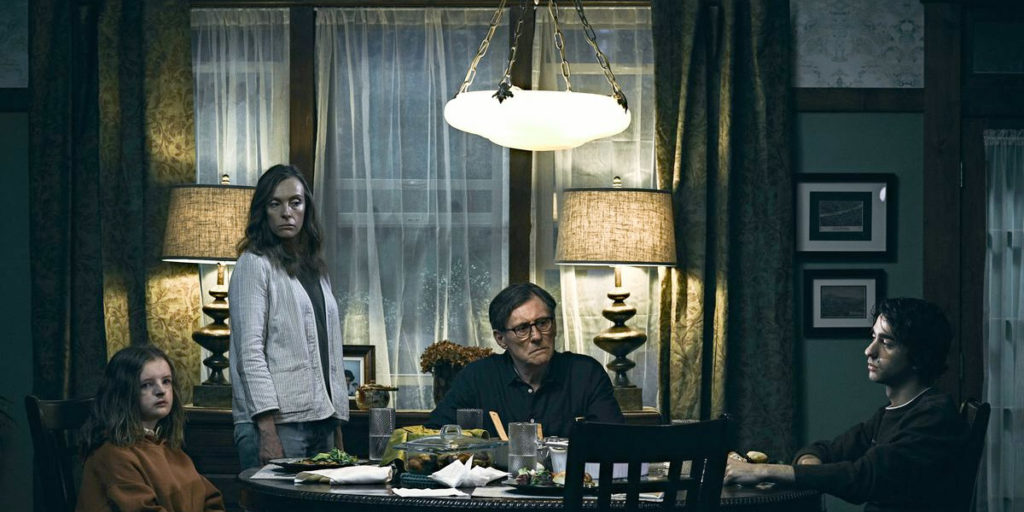
Hereditary scared the shit out of me. At its most base level, it’s just a gnarly horror movie—the kind that makes you cringe/giggle because you’re too scared to watch what’s happening on screen. At several points during the film, watching alone at home, I pulled out my phone to surf twitter just to give myself a break from the tension.
So…uh…how is this one of my favorites of the year? Because it’s just so well crafted. A lot of horror films are schlock, but Hereditary combines virtuoso precision with base-level scares. Director Ari Aster (who I discovered on Short of the Week via this twisted as f-ck short film) somehow manages to give both types of viewers—the art-house beret-wearer and the mainstream horror fan—what they want. The mood is immense, the tension is palpable, and the scares are effective. Most impressive of all, he never resorts to the usual jump scares so many horror films rely on as a crutch. Rather, he organically builds the suspense in each scene. No cheap shots here.
The film almost becomes over-plotted in its final act (it feels like it introduces another movie’s worth of mythology in the last 30 minutes), but I can forgive that…at least Aster is attempting to give the audience a semblance of closure, instead of doing the annoying indie thing of “leaving it up to the audience.” Moreover, it’s a showcase for just how talented of a filmmaker he is. Word on the street is that he doesn’t even like horror movies…he just knew he could get one made. I’m excited to see what his warped sensibilities will tackle next.
The Haunting of Hill House: Season 1
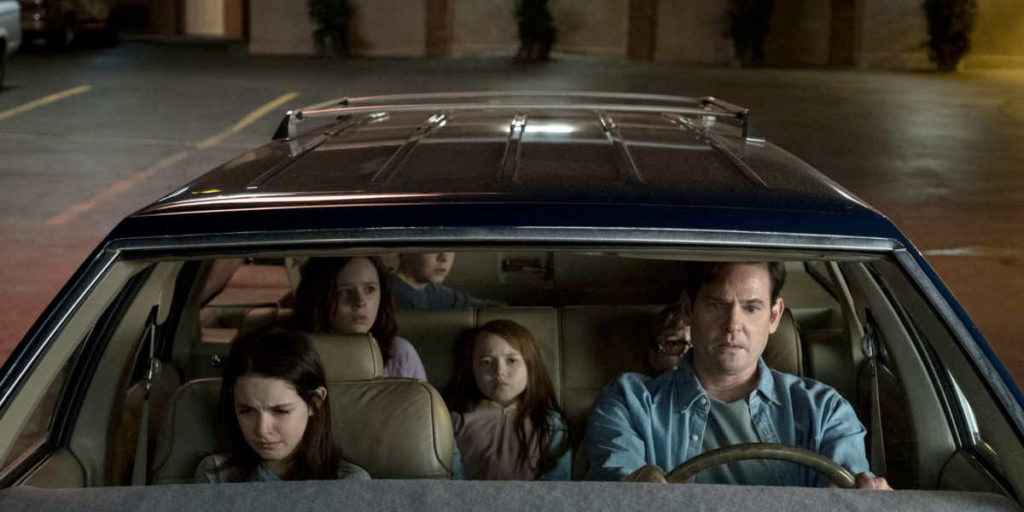
As my colleague at Short of the Week often likes to troll, horror is bad. While it’s obviously a ridiculous blanket statement to cast off an entire cinematic genre (especially one so popular), I think what he actually means to say is that most horror is lazy, relying on cliché tropes to become a bland jump scare distribution device
Haunting of Hill House shouldn’t have been a good fit for me. It’s about as classic a haunted house story as you can get. But, I was amazed at how clever some of its horror set pieces are, (especially a terrifying sequence with a floating man in search of a bowler hat). But, beyond that, this is the rare horror project that genuinely cares about its characters. They aren’t just meat-puppets waiting for a slasher to gut them—they’re a nuanced, dysfunctional family that you legit care about. The relationship stuff works just as well as the horror. It’s also beautifully shot and crafted, with some real filmmaking verve on display (episode six is comprised of a sequence of long takes that are just objectively impressive technical achievements). Towards the end, things get a bit saccharine, but, I’m okay with that. Again, Hill House cares more about these characters than just scaring and torturing them, and, so, the resolution ends up being satisfying in a way that few horror films are—it’s more about heart than fear.
Also worth mentioning: Carla Gugino is a goddess who doesn’t age, which is some sort of ghost story in and of itself.
Spider-Man: Into the Spider-Verse
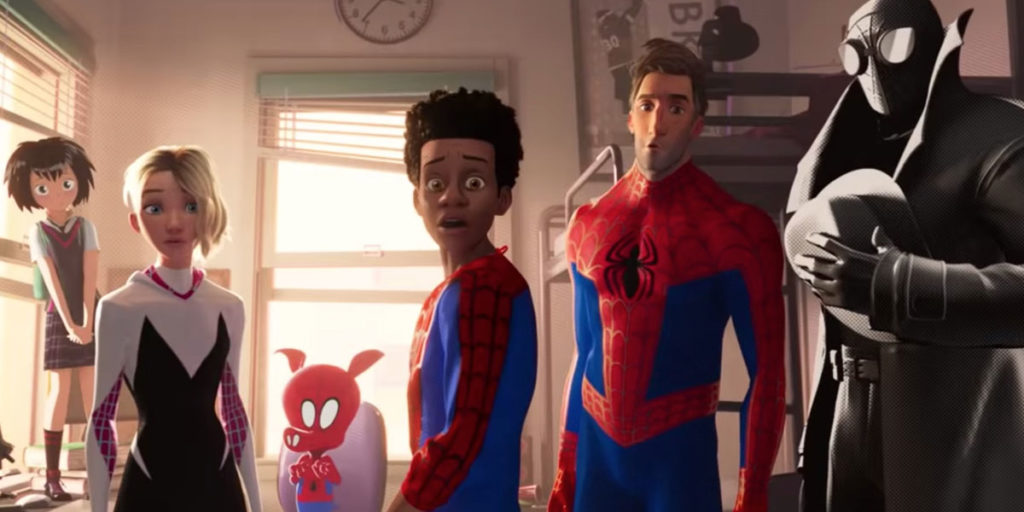
It’s hard to believe that back in 2014, the Web-slinger’s cinematic future looked grim. We had two crummy Spider-Man movies in a row, and that is AFTER Sam Raimi had emo-Spidey hip thrusting down the sidewalks of New York. But, miracles are possible. After Spider-Man’s integration into the Marvel cinematic universe (I’m a huge Homecoming fan), I didn’t think things could get much better. But, my expectations were constrained by my limited, linear way of thinking…
Sony Animation has made a real cracker of a film here—a kinetic and exciting pop-art collage that is backed by great writing and character work. Spider-Verse manages to both pay respect to the classic “with great power” origin story, while also breaking down the formula so things can start fresh again. It’s the rare film that tips its hat to the old fans, while also laying the groundwork for an entirely new generation.
Better Call Saul: Season 3
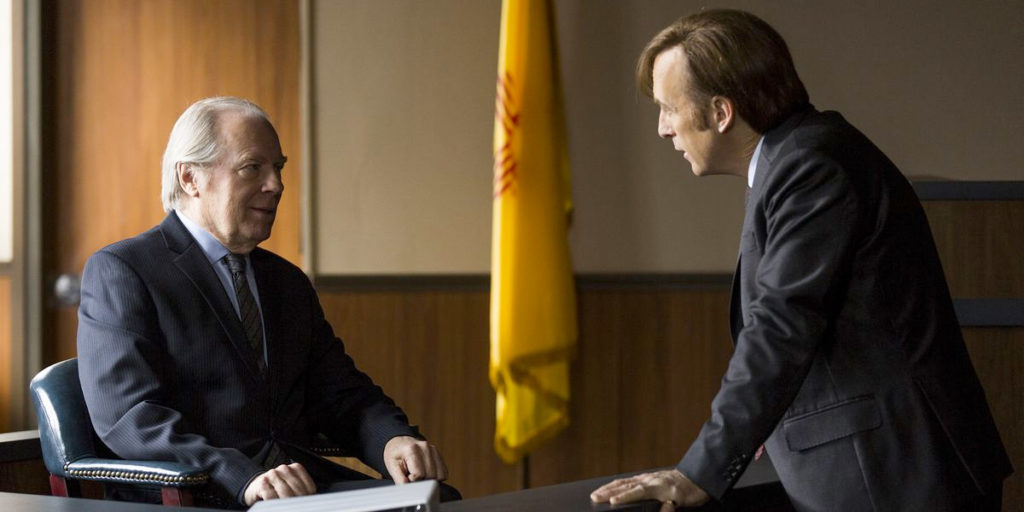
Yeah…I know…I’m a year late on this. But, I don’t have cable. Sue me.
Five years ago, if you would have told me that I would like the spinoff of Breaking Bad better than Breaking Bad, I would have asked you what drugs you were on and if I could have any.
But, here we are. The world is unpredictable and Vince Gilligan’s Better Call Saul has proven to be a deeper, more engaging character study than Walter White’s now infamous rise and fall. Season three keeps up the great work from the previous two seasons, but manages to keep building on its characters. The great joy of this show is watching Jimmy McGill (Bob Odenkirk doing the best work of his career) slowly slide his way into a point of moral no-return. Each little decision brings him closer and closer to the precipice. And, so, every episode we watch him break bad, going further and further to the darkside. The dynamic between Kim Wexler (Rhea Seehorn) and Jimmy continues to be stellar, proving to be the show’s definitive relationship. Damn, I love Kim Wexler…
Season three also gave us the much anticipated arrival of Breaking Bad heavy Gus Fring. The best episode? Number five, Chicanery, which takes place almost entirely in a courtroom as Jimmy attempts to save his career. It’s literally just people talking and it’s the most riveting 45 minutes of anything I’ve watched this year.
BoJack Horseman: Season 5
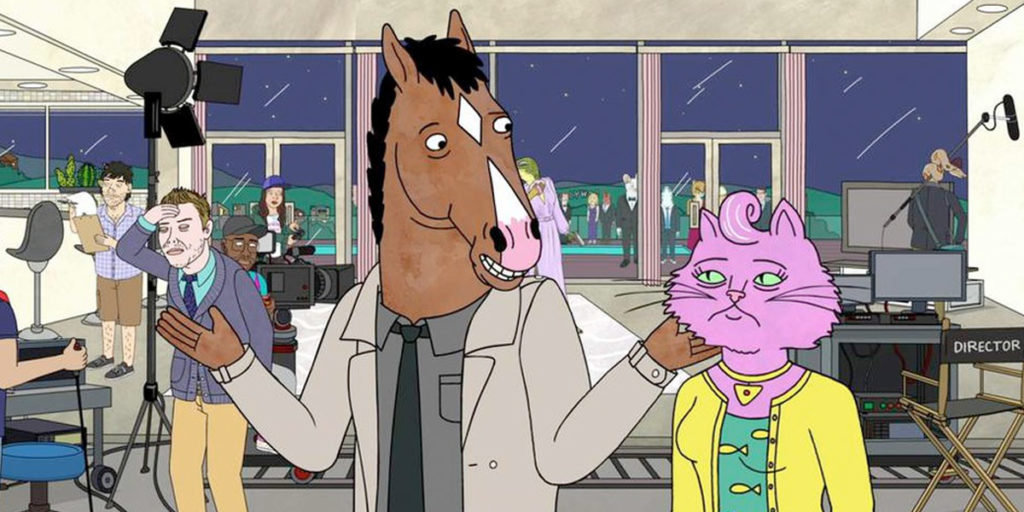
Never has existential ennui hurt so good. Raphael Bob-Waksberg’s BoJack Horseman is sort of an anomaly. It’s the kind of thing that’s impossible to explain to people: a goofy animated series that satirizes the entertainment industry, while also being a deep and introspective look into the human condition, starring anthropomorphized animal people Yeah, on paper, it sounds like a mess. But this show, man…this show just gets you in the gut. It somehow manages to juxtapose both goofy slapstick and real takes on big issues like depression, trauma, addiction, and self-destructive behavior.
Season five continues the show’s incredible tonal balancing act, covering stuff like opioid addiction and the #MeToo movement, while also featuring dumb side plots about sex robots and useless websites. The highlight for me was episode six, which is entirely composed of BoJack giving one long monologue during a funeral. It’s incredibly written—a one-man-play, that is funny one second, heartbreaking the next. It’s a testament to how Waksberg and his writing team have so skillfully built up these characters over five seasons, so they know just how brutal it will be when they start breaking them down
Succession: Season 1
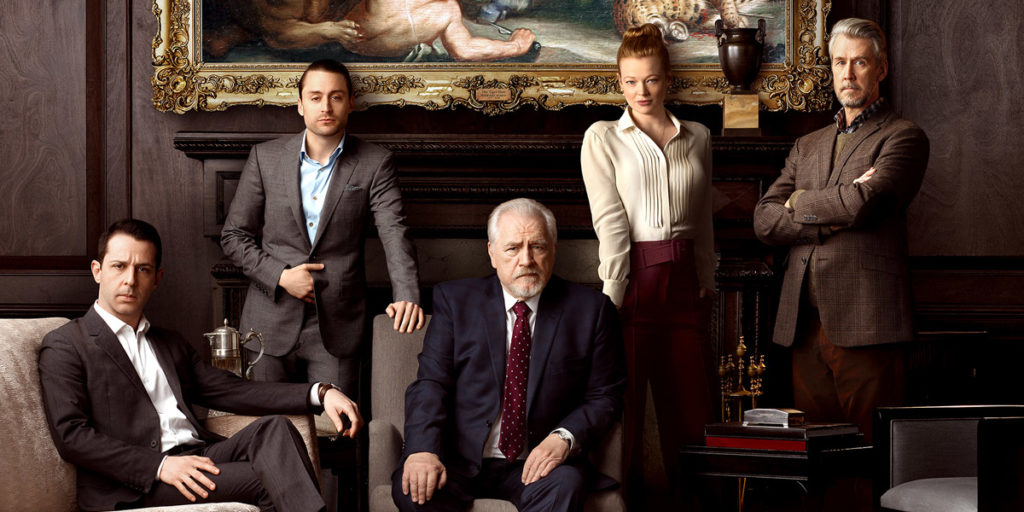
In the age of Trump, do we really need a TV series about entitled rich assholes and the powerful company they control? Well, if Jesse Armstrong is involved the answer is yes…yes we do.
Succession is just gripping television, featuring some of the best and most compelling dialogue I’ve seen in recent memory. It’s a story about America…about excess…about how such flawed people on the top have such impact and control over the people on the bottom.
The real magic trick is how Armstrong manages to make compelling characters out of his entire fictional Murdoch-esque clan. From the annoying, quippy Roman to the deeply flawed, but also surprisingly human, Kendall (Jeremy Strong gives my favorite performance of the year). If the Wolf of Wall Street makes excess look like a lot of fun, Succession makes it look awful: a constant fight for power and legitimacy that never lets you put down your guard. All of this culminates in a thrilling and tragic finale that feels both satisfying, but also leaves the show open to travel is so many different directions. More please!
Barry: Season 1
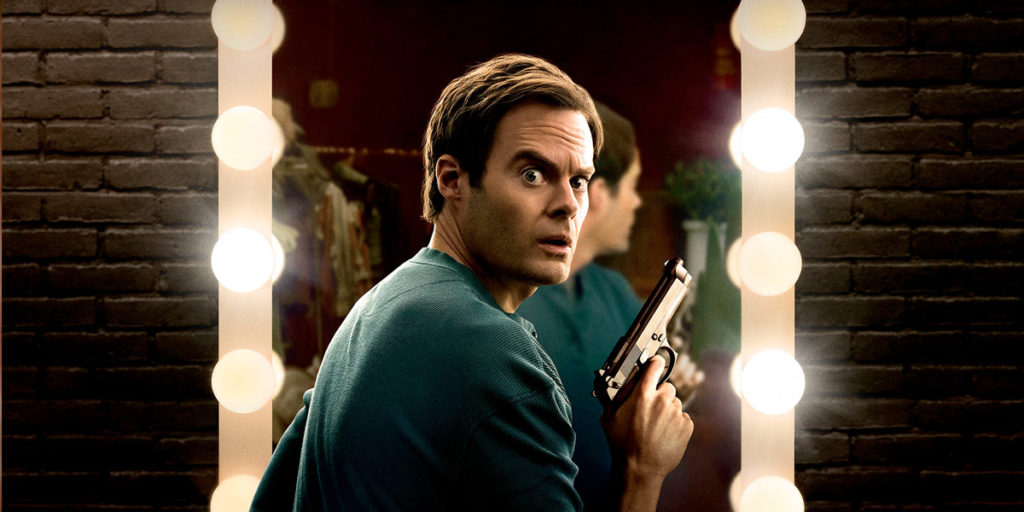
Barry is a miracle of tone juggling (see…there’s that word again). I’ve honestly never watched something that can be so gleefully and broadly comedic one scene, and so dark, serious, and disturbing the next. BoJack definitely does this, but it has leeway because it’s literally a cartoon. With Bill Hader—playing a conflicted hItman who gets involved in the amateur acting scene of Los Angeles—the leap is that much harder to make. Yet, somehow, Alec Berg and Hader pull it off.
At first I wasn’t sure the series could sustain itself—it feels very high-concept in an 80s comedy sort of way (this hitman wants to be an actor! LOL!). But, as the film progresses, it explores Barry’s inner-life in a manner that is surprisingly deep, building to a final sequence that includes one of the finest “cut to black” moments in recent memory. The show is asking deep questions about the nature of morality, about becoming the person people say you are. Barry is constantly telling folks that he’s not a bad guy, but the show never lets him off the hook. And, so, even in the midst of some truly inspired comedic moments (honestly…was there a better side character this year than Noho Hank?), the show never loses a weighty sense of stakes, both in terms of plot and Barry’s internal turmoil. I’d be totally cool if there wasn’t a season 2 (don’t worry…there will be). It’s not because I don’t want to watch more of this story—I definitely do. But, it’s just rare to find a season of television that feels like a complete thought.
American Vandal: Season 2
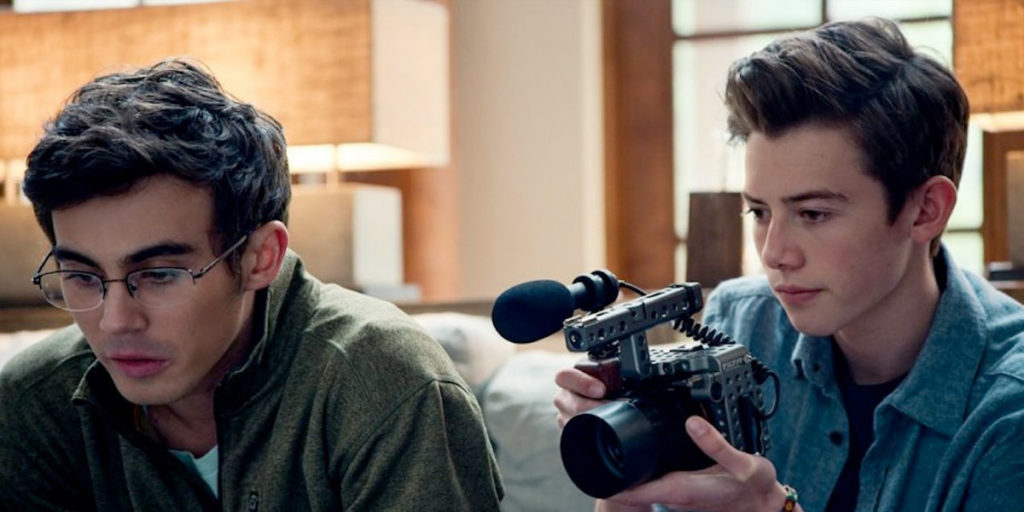
American Vandal has saved the mockumentary form. What was once a unique skewering of an entire genre has, in recent years, become bogged down by absurd characters and lame punchlines—a comedy template that essentially amounts to a “CUT TO” of Jim Halpert making a glib expression rather than writing an actual joke.
But, Vandal has figured out that the jokes aren’t the draw—the story is. And, so they take this hyper ridiculous premise (dick and poop jokes in each respective season) and approach it with the utmost seriousness. It helps that we’re true crime obsessed in our collective pop culture, and Vandal also really gets what makes crime stories compelling. With the luxury of being able to craft their mysteries from scratch, creators Tony Yacenda and Dan Perrault structure an insanely entertaining whodunit, full of multiple suspects, theories, and red herrings. Moreover, they actually pay all of it off in a surprising and satisfying way. It’s such a bingable show…you really want to find out what’s going to happen next in the case.
In that sense, American Vandal is an incredible accomplishment: a funny parody that is also a legitimately interesting mystery story. But, the show goes even further than that: it’s actually about something meaningful. In Season 2, the film tackles online bullying and social media in a way that is honest and enlightening. Never has a piece of entertainment better captured the way kids today are both using and profoundly impacted by their digital personas. It took a show about poop to reveal such a nuanced and authentic look about the connected world we live in. Best thing I’ve watched this year.

